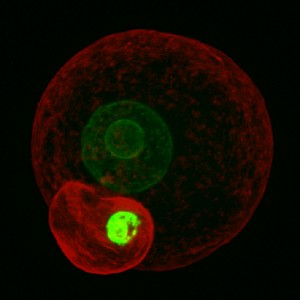
An image of a parthenote, courtesy of Alison Kim, PhD
An interdisciplinary team from the Oncofertility Consortium published a paper today in the journal Science on the intersection of politics and scientific research. The group, made up of a historian, a bioethicist, and scientists from the Oncofertility Consortium highlighted how a flawed U.S. law restricts research in fertility preservation for cancer patients. Specifically, the law prevents federal funding to pay for research that uses parthenotes in research.
Parthenotes are a group of cells derived from an egg that begins dividing without fertilization from sperm. The short policy article in Science describes the biology of parthenotes and explains their potential broad benefits for research in many aspects of cancer, fertility, and oncofertility. As we discussed in a previous blog post, parthenogenesis could be used for researchers to identify eggs that are healthy enough to begin the early stages of cell division. This activation would allow scientists to identify methods to successfully mature eggs outside of a woman’s body that are ready to be fertilized. This could help oncofertilty patients who have lost the ability to have biological children due to cancer and its treatment.
Tingen et al. also describe the history of the law-in-question, the Dickey-Wicker Amendment, which prevents the production, use, or destruction of embryos or parthenotes with federal money. In 1993, the U.S. Congress and President Bill Clinton gave the National Institutes of Health (NIH) the authority to provide financial support for human embryo research. Before funding such research, the NIH established a group of 19 experts in science, medicine, ethics, law, and social science, called the Human Embryo Research Panel to determine the moral and ethical issues raised by this research.
The panel found that the creation of parthenotes for research purposes was ethically acceptable while embryo research warranted additional review. As such President Clinton directed the NIH to prevent funding for most embryo research but allowed them to provide money for studies on parthenotes. A few years later the Dickey-Wicker Amendment was drafted to restrict all embryo research. Looking at prior legislation, these non-scientists included the term “parthenote” into the bill.
Recent legal rulings have brought embryo research and the Dickey-Wicker Amendment into the spotlight again. Rather than continue this mistake in the law, the authors in the Science article call for the removal of parthenotes from the Dickey-Wicker Amendment. They provide a more detailed explanation of their position in an upcoming article in the American Journal of Bioethics.

